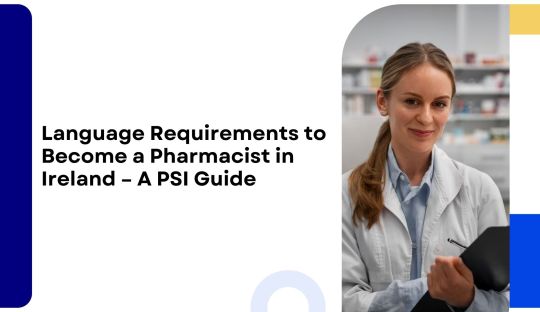Don't wanna be here? Send us removal request.
Text
Language Requirements to Become a Pharmacist in Ireland – A PSI Guide

Ireland continues to be a top destination for internationally trained pharmacists seeking to build a professional career. If you're exploring how to become a pharmacist in Ireland, one crucial area to focus on is the language requirement, as set by the Pharmaceutical Society of Ireland (PSI). With recent updates to the registration pathway, it’s essential to stay informed—especially about communication standards, which play a key role in ensuring safe and effective healthcare delivery.
This guide breaks down the PSI’s language competence policies, the accepted English language tests, and what steps you must take to meet these requirements on your journey to becoming a registered pharmacist in Ireland.
Why Language Skills Matter for Pharmacists in Ireland
Communication is at the heart of pharmacy practice. Whether counseling patients, coordinating with physicians, or managing prescriptions, pharmacists must communicate clearly and precisely. That’s why proving English language proficiency is a key part of the PSI Equivalence Course registration process for overseas pharmacists.
Ireland has two official languages—Irish and English—but English is the primary language of communication in healthcare. So, understanding and demonstrating competency in English is non-negotiable if you're aiming to work as a pharmacist in Ireland.
PSI Language Policy: An Overview for International Pharmacists
The PSI follows the Professional Qualifications Directive, an EU regulation that ensures healthcare professionals—including pharmacists—possess the necessary language skills to practice safely. This directive is supported by the Pharmacy Act 2007 (as amended) and the PSI Registration Rules (2008–2017).
Together, these legal frameworks guide the assessment and recognition of language competence for applicants registering with the PSI.
How to Prove Your Language Competence
If you're wondering how to become a pharmacist in Ireland as a foreign-trained professional, here are the three primary pathways to prove your English proficiency:
1. Pharmacy Qualification from an English-Speaking Country
If you completed your pharmacy degree in a country where English is the native or official language—such as the UK, USA, Canada, Australia, or New Zealand—you automatically meet the PSI’s language requirement. No separate English test is needed.
2. Work Experience in an English-Speaking Healthcare Environment
Applicants who have worked as a pharmacist in Ireland or other English-speaking countries for at least three years within the last five may also fulfill the requirement. You'll need to submit verified documents, such as employment letters or regulatory registration proof, to support your claim.
3. Passing a Recognized English Language Test
If neither of the above applies, you must take an approved English language proficiency test and meet the PSI’s required standards. The PSI recognizes the following exams:
IELTS (Academic)
OET (Pharmacy-specific)
TOEFL (iBT)
Cambridge Assessment of English (CAE)
All test scores must reflect a minimum CEFR Level C1, which indicates advanced language proficiency.
PSI Language Test Criteria: What You Should Know
The PSI has adopted CEFR Level C1 as the minimum threshold for English language skills. To meet this standard, your test results must achieve or exceed the base scores in all components: listening, reading, writing, and speaking.
Super-Scoring Policy
Good news: the PSI allows super-scoring, which means you can combine the best scores from two attempts of the same test type (e.g., two IELTS or two OET sittings) taken within two years. However, you must meet the minimum score in each section across both attempts.
Note:
Home-based tests are not accepted.
Scores must be submitted directly by the test provider to PSI.
Login credentials or unofficial results will not be accepted.
List of Accepted Language Tests
The PSI accepts results from the following tests for verifying English language proficiency:
IELTS (International English Language Testing System)
OET (Occupational English Test for Healthcare Professionals)
TOEFL (Test of English as a Foreign Language)
CAE (Cambridge Assessment of English)
Other tests may be accepted if:
They are taken in person at a test center.
The results match CEFR Level C1 standards.
Scores are sent directly to the PSI.
What If You Don’t Meet the Language Requirements?
If you fail to meet the language standards or receive a low score, you'll need to retake the test after appropriate preparation. Some candidates may choose to enroll in English language training programs before attempting another exam.
Delays in submitting your language test results can affect your registration timeline, so plan your test dates accordingly.
Final Thoughts:
Mastering English communication is a foundational step if you're aiming to register as a pharmacist in Ireland. Whether you're a recent graduate or an experienced professional, meeting the PSI’s language requirements is essential to practicing safely and effectively.
If you're serious about how to become a pharmacist in Ireland, focus early on fulfilling the language criteria—whether through education, work experience, or an approved language exam.
Ready to Take the Next Step?
Start preparing now with practice tests, language coaching, or professional guidance. Meeting the PSI’s language standards not only unlocks your registration but also ensures you’re fully equipped to deliver high-quality patient care in Ireland’s healthcare system.
0 notes